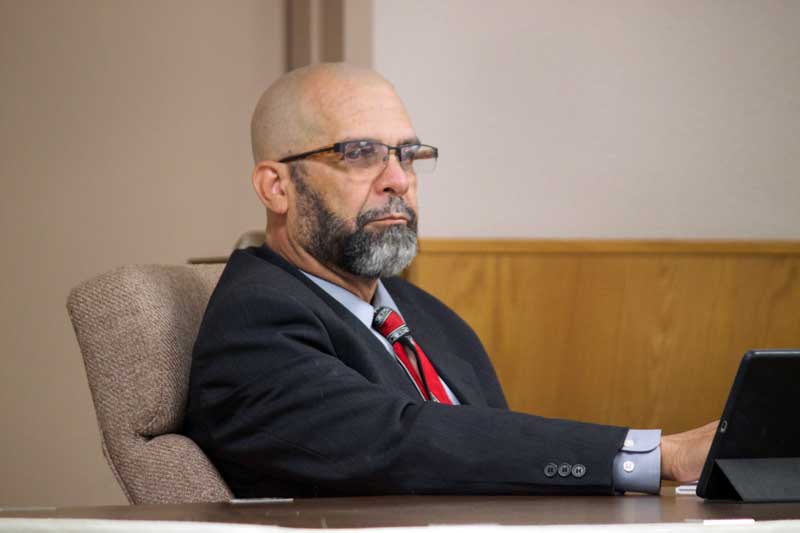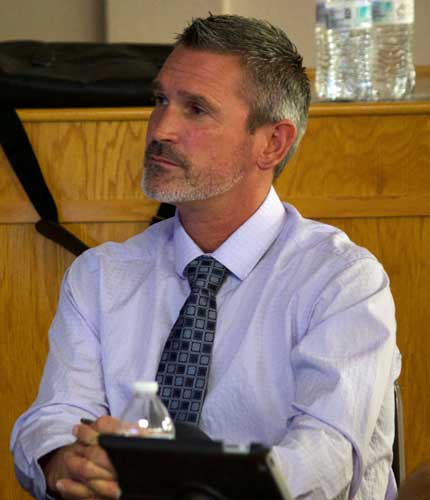By Jon Johnson
“Nothing is so permanent as a temporary government measure.” – American Economist Milton Friedman
SAFFORD – Arizona is known for its sunsets, however, the sun will likely never set on the city’s formerly temporary half-cent sales tax increase.
Safford Finance Officer Alma Flores gave a presentation to the Safford City Council at its work session Monday night and recommended eliminating the sunset clause in the city’s half-cent sales tax, which was enacted by council degree in November 2005 and was set to expire in 2025. Flores was given direction to put her ordinance to rescind the sunset clause on the agenda of the next council meeting to be put up for a vote.
The tax was initially passed to pay bonds taken out for a 12-phase streets renewal program that redid numerous streets throughout the city over a five-year timespan, including 8th Avenue. The measure increased Safford’s city tax from 2 percent to 2.5 percent. However, according to Flores, the bonds won’t be paid off until fiscal year 2030/31 due to refinancing that occurred in 2015 and not rescinding the end date would be disastrous to the city. The refinancing that was done will reportedly save Safford $700,000, according to City Manager Horatio Skeete.

Jon Johnson File Photo/Gila Valley Central: There are still more streets that haven’t been renovated, including 14th Avenue.
According to Flores, the tax currently generates a little more than $1.1 million per year in revenue with an average growth rate between 2 and 3 percent and makes up nearly 40 percent of the city’s total operating costs regarding its streets. Other revenue includes Highway User Revenue Fund (HURF), automobile taxes, grants and street patch funds. Roughly $550,000 of the current annual $1.1 million collected by the tax goes to pay the debt service on the bonds. If rescinded, that would open up the annual leftover amount of $550,000 to be used as the city council pleases.
Due to having to budget to pay the bonds, Flores previously reported at an April council meeting that if the sunset clause was not rescinded the city would begin to have a deficit in its street’s department starting in fiscal year 2018/19 and much-needed street work, including 14th Avenue, would not be possible to fund. She added that if the sunset clause was not rescinded, by 2031 the city would have nearly an $8.2 million deficit in its street’s department. Conversely, she said if the city ended the clause and adjusted its capital projects, it would have a more than $700,000 surplus the next year and would end up with a nearly $300,000 surplus by 2031 while completing all the necessary projects.

Jon Johnson File Photo/Gila Valley Central: Safford City Manager Horatio Skeete said if the sunset clause was removed the excess money from the half-cent sales tax could be utilized however the council wished and wouldn’t have to just be dedicated to its streets program.
That surplus apparently got city administrators thinking what they could do with that money, including utilizing it for other items other than roads and putting it toward assisting the infrastructure repairs for the city’s aging water system, according to Flores.
In 2005, the council decided to enact the sales tax increase themselves rather than put it to a vote so the council could amend it if necessary without relying on a vote of the people. At that time, current Graham County Supervisor and former Safford City Councilor Ed Ragland both expressed their desire for the council to handle it.
“I’m not willing to hold an election every time a tough decision comes,” Ragland said in an August 2005 council meeting.
At the April council meeting, Ragland expressed his support for rescinding the sunset clause because people are already used to paying it.
“I think it’s great,” he said at the April meeting. “I think it’s one of the least painful increases or rates that your citizens are going to see.”

Jon Johnson Photo/Gila Valley Central: Safford Mayor Jason Kouts listens attentively during Monday night’s council work session.
Safford Mayor Jason Kouts (looking fit as a fiddle after his recent health concerns) previously expressed his opposition to rescinding the tax but had done an about-face by Monday night.
Kouts said in speaking with city officials and others, he is now in favor of rescinding the sunset clause and keeping the tax with the caveat that while it will primarily be used to pay off the still lingering streets renewal program debt, additional money collected from the half-cent sales tax could be utilized in other areas as well. He also expressed his desire to keep the power to alter the tax in the council’s hands in case future council members wish to alternate to suit the city’s needs at that time.
“This makes sure we get our debt paid off and it opens flexibility to our future council,” Kouts said.
Councilor Arnold Lopez expressed his concern about removing the tax from the dedication to use it for streets but Skeete assured him that by freeing it up the money would be best used where the council deems it most needed at any given time.
“As long as you are on the council you can make your decision as to what happens,” Skeete said. “When somebody else is here, unfortunately, they might not make the same decisions you make.”
Councilor Gene Seale also expressed his appreciation on the flexibility of the tax.
“Had this been voted on by the general public that this be used for streets we would have no flexibility,” Seale said. “And so, I think the fact that it was the council that did it is just an example of what we’ve been talking about here is that we’re not tying the hands of future councils because they then have the option to assess the needs at that particular time and adjust things to meet those needs.”
The draft ordinance has already been reviewed by the city’s contract attorney, Bill Simms, and will likely be on the council’s next agenda Oct. 9, where it looks as if it will pass unanimously.













